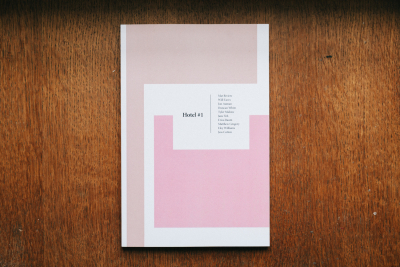More recommended reading from the literary journals
By MICHAEL CAINES
A word about literary magazines on this blog is overdue ��� sorry, we've been busy thinking about Sarah Moss, Soviet picture books and Chet Baker. What fine distractions are to be found in the summer crop of journals new and old, famous and fresh?
The freshest first, and a full disclosure: Hotel is a "magazine for new approaches to fiction, non-fiction and poetry" that is one issue old; and I had the pleasure of attending the launch for that issue, on the night after the EU referendum, because a former TLS editor contributed to it. Let us not dwell on Will Eaves unnecessarily. Instead, I can only say that Hotel's debut offers some "Notes on the Pink Hotel", by Jess Cotton, on pink paper ("I think of Rimbaud, far from his soft city rain . . ."), a couple of poems by Jane Yeh ("The maid thinks of cream cakes and breaking rules") and an excellent essay by Tyler Malone, "Sometimes He Left Messages in the Books", about the fate of David Markson's extensively marked-up library.
Markson's reputation stood sufficiently low at the time of his death in 2010 for the Strand Bookstore in New York to scatter his books along their 18 miles of shelves in the ordinary way, rather than keep them together. Every day for six months, Malone spent a few hours hunting around for them, and helping other enthusiasts find them, too ��� not an absolutely straightforward matter when The Autobiography of Alice B. Toklas is "filed under T for Toklas instead of S for Stein", and books are (understandably) taking months to emerge from storeroom to open shelf. Yet "it is not just a delight to read Markson reading", Malone argues, referring to the marginal comments Markson made, the underlinings that led directly to passages in his books, "but it is truly indispensable to any study of the man and his work".
Online, meanwhile, the seventh edition of Prac Crit has appeared. This is a triannual "journal of poetry and criticism" that specializes in looking at contemporary poetry "up close" ��� it's an invaluable approach, I think, not least for anybody for whom the words "contemporary poetry" brim with menace.
Here are, for example, poems by Matthew Welton ("Think of it as the rubber ball we've hidden / in the fruit bowl . . .") and Katrina Porteous ("Imagine it a ruin . . .") that come with parallel critical responses (in these respective cases, an interview by Alex MacDonald and an essay by Jenny Holden). You keep the poem in sight in the left-hand half of the screen while scrolling through the prose on the right ("When we met by the stone lions in Market Square, Matthew was concerned with finding us a pub to talk in"). Kiki Petrosino, meanwhile, walks you through one of her own poems, "Scarlet", via thirteen footnoted stepping stones. Although maybe my metaphor's wrong here: it's more a case of taking a tour around the roots of a tree, discovering that one lies in childhood illness, another in the Super Mario Brothers video game, a third in a preference for the ampersand. "I prefer it for its visual dynamism; an ampersand looks both energetic & ornamental to me, like jewelry made from typewriter keys, spoons, or the innards of watches."
These are but striplings, though. Congratulations are due to Slightly Foxed: The real reader's quarterly ��� who is this real reader, I wonder, and what has she done with all the others? ��� for publishing its fiftieth issue this summer. Pleasures here include Laura Freeman's piece on Elizabeth David's elopement, which unexpectedly turned her from an actress into a cookery writer, and Richard Mabey's homage to the "swashbuckling" Round the World in Eighty Dishes by Lesley Blanch. There is also Michael Holroyd's warm appraisal of Dan Rhodes, which is surely destined to be excerpted for publication on the back of a paperback some time soon:
". . . his books would appeal, I believe, to many readers. But he avoids journalism, does not belong to any literary groups or contemporary school of writing and is very much an individual novelist. He neither pursues fame nor patronizes his readers. What he believes is what you get: sensitivity, humour, sadness and devastating shock. Sometimes I have been so saddened, so shocked, that I have stopped reading and put the book aside. But before long I am compelled to pick it up again and read on. And what I have read has found a place in my imagination."
What lies beyond fifty issues? Well, Granta recently reached no. 136 (with the theme "Legacies of Love") and Ambit hit no. 224. Not to get carried away, however, I'll close with a solemn nod to the Dublin Review (63 not out). Here, amid the contributions with eye-catching titles such as "The transhumance" and "Uncle uncle uncle uncle uncle", is Rob Doyle's "To the Point of Death", the record of an intellectual relationship. That's the dry way of putting it. Doyle writes about losing himself in "the overpowering, life-justifying rapture" of clubs and drugs, while taking philosophical succour from the works of Georges Bataille. In Paris (not the City of Lights but the "City of Condoms") Doyle makes a Bataille pilgrimage, heading for the Rue de Rennes, near Montparnasse, where the great man lived for a formative period of his life. Only later, as Doyle turns thirty-three, he realizes that he had felt older when he was younger, and Bataille had been the guide to see him through that gloomy period of his life. "If philosophers were musical sub-genres, then Bataille was death metal ��� and death metal was insufferable, its devotees a gang of dreary bastards." What fun it is, being in on this gradual process, without having to go through it yourself.
Peter Stothard's Blog
- Peter Stothard's profile
- 30 followers




